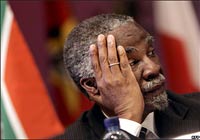Sahara conflict: Morocco versus South Africa
 The resolution 1783 adopted unanimously earlier by the United Nations Security Council on the Sahara issue consecrates the negotiation process which seeks to reach a negotiated political solution to the conflict. It welcomes as serious and credible Morocco's efforts to move the process forwards towards resolution and the progress made by the parties to enter direct negotiations in an allusion to the two rounds of UN-led talks held in June and August in Manhasset. The Security Council refers to the efforts deployed by Morocco and to the Moroccan Autonomy Initiative, which has been elaborated in the framework of a large national consultation process that involves the Sahara region populations, a process that spread out during the course of the year 2006.
The resolution 1783 adopted unanimously earlier by the United Nations Security Council on the Sahara issue consecrates the negotiation process which seeks to reach a negotiated political solution to the conflict. It welcomes as serious and credible Morocco's efforts to move the process forwards towards resolution and the progress made by the parties to enter direct negotiations in an allusion to the two rounds of UN-led talks held in June and August in Manhasset. The Security Council refers to the efforts deployed by Morocco and to the Moroccan Autonomy Initiative, which has been elaborated in the framework of a large national consultation process that involves the Sahara region populations, a process that spread out during the course of the year 2006.
The Resolution1783 constitutes a new political signal, as far as the support enjoyed by the Moroccan Initiative is concerned, by both the international community and the Security Council. The council members decided also to extend the mandate of the United Nations Mission for the Referendum in Western Sahara (MINURSO) until 30 April 2008. The UN mission is present in the territory since 1991 to supervise the UN-brokered ceasefire concluded between the two warring parties.
While the international community is endeavoring to find a solution to the 32-year old dispute, praising in this regard Morocco's efforts, South Africa's Ambassador Dumisani Kumalo looks irritated at the Security Council's resolution welcoming, once again, as "serious and credible" the kingdom's proposal to grant substantial autonomy to the Sahara in a bid to end the dispute.
The Ambassador even voiced his objections to this resolution which he ended up voting in favor.
A non permanent member of the Security Council, South Africa seems to enjoy acting as a spokesperson of the Polisario, joining thus Algeria. These two countries, instead of pushing forward for a solution to the conflict, prefer to go it alone.
Such an attitude clearly puts in an awkward position the South African country, and observers at the United Nations hardly understand this position. South Africa has adopted a biased stance over the Western Sahara conflict…
While the international community is endeavoring to find a solution to the 32-year old dispute, praising in this regard Morocco's efforts, South Africa's Ambassador Dumisani Kumalo looks irritated at the Security Council's resolution welcoming, once again, as "serious and credible" the kingdom's proposal to grant substantial autonomy to the Sahara in a bid to end the dispute.
The Ambassador even voiced his objections to this resolution which he ended up voting in favor.
A non permanent member of the Security Council, South Africa seems to enjoy acting as a spokesperson of the Polisario, joining thus Algeria. These two countries, instead of pushing forward for a solution to the conflict, prefer to go it alone.
Such an attitude clearly puts in an awkward position the South African country, and observers at the United Nations hardly understand this position. South Africa has adopted a biased stance over the Western Sahara conflict…
